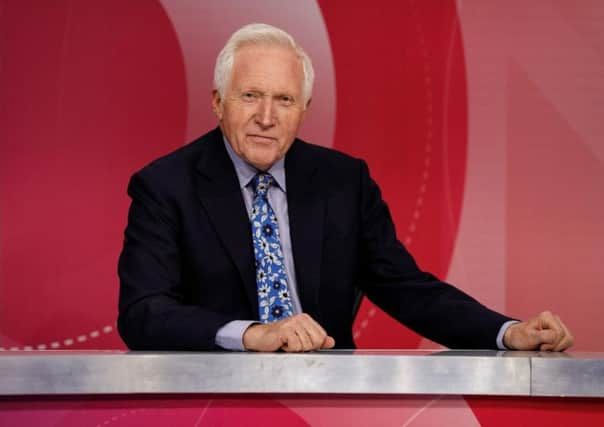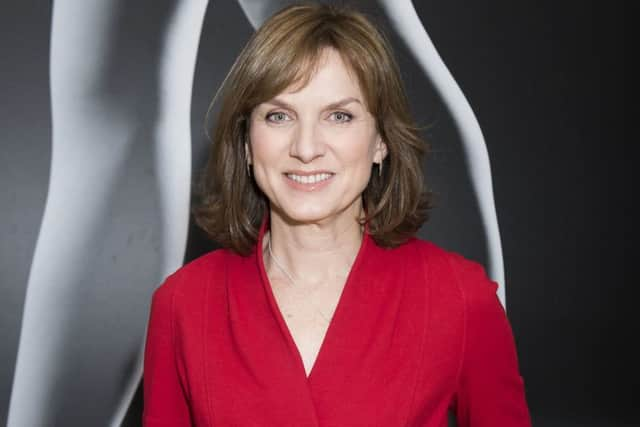Bernard Ingham: '˜Softer feel' will make Question Time hard going when Fiona Bruce replaces David Dimbleby


David Dimbleby’s last “performance” as presenter of the BBC’s Question Time does not mark the end of an era. His younger brother, Jonathan, is still presiding over Any Questions? on Radio 4.
Incidentally, Jonathan and I once shared a dram or two of Highland Park when I took part in Any Questions? in Kirkwall in the Orkneys. Against the odds, it was a sober occasion with a serious political discussion, even with the Scottish Nationalists taking part.
Advertisement
Hide AdAdvertisement
Hide AdThe Dimblebys will go down in history as the broadcasting family par excellence.


They have been doing the serious stuff of enlightening the nation – and presenting our great moments of remembrance, politics and royal events – for as long as I can remember. As a Prime Minister’s press secretary, I found them serious and workmanlike.
Which brings me to the problem facing David Dimbleby’s successor who has been named as Fiona Bruce of Antiques Roadshow fame. The BBC tells us it wants “a softer feel” to the programme. I am full of foreboding.
It was, I think, inevitable that, with the BBC committed to closing its “gender gap”, a woman should chair Question Time. And I write as one entirely cured of misogyny after working for Barbara Castle and Margaret Thatcher and sitting on a committee chaired by Baroness Betty Boothroyd who was a fellow member of the Labour League of Youth in the West Riding.
Advertisement
Hide AdAdvertisement
Hide AdI have not the slightest doubt about Ms Bruce’s capacity to steer any television programme. It’s her bosses that worry me.
They have already to some extent dumbed down both Question Time and Any Questions? by assembling a hotch-potch panel of activists, and too often managing to produce audiences which are thought to be unbalanced.
They want action, lights, noise and perhaps even a bit of mayhem now and again. After all, it is good for publicity, good or bad.
This is because the celebrated (and overpaid) executives at the BBC are in the business of entertainment, not enlightenment. They prove it by telling us they are impressed with Ms Bruce’s authority, warmth and ability to connect with the audience and champion their concerns.
Advertisement
Hide AdAdvertisement
Hide AdI have not the slightest objection to authority, warmth or an ability to engage with an audience, but I draw the line at their championing its concerns. It is not the job of a presenter to champion causes but to keep reasoned discussion flowing to make us better informed.
I am pretty sure the Dimbleby brothers feel their job has got more difficult over the years. To be fair, this is not just because of their bosses’ approach to TV. It is also because political discourse has become less tolerant, less understanding of an opponent’s views, more raucous and coarser.
There is no doubt that I had the best of the Dimblebys, broadcasting and political discussion.
I have no idea what causes Sir Robin Day (once an ambitious Liberal), Sir Alastair Burnet, ex-Labour MP Brian Walden or Jimmy Young espoused – not even Walden, who in private manifested a great enthusiasm for Mrs Thatcher, once describing her as the best Prime Minister since William Gladstone.
Advertisement
Hide AdAdvertisement
Hide AdAll of them subjected Mrs Thatcher to some very tough questioning – Burnet, I particularly recall, over unemployment and Walden after the resignation of Chancellor Nigel Lawson.
They were above all polite, if firm, and obviously deeply interested in what she had to say, exploring any inconsistencies and putting alternative points of view to her.
I had the confidence in their professionalism to persuade Mrs Thatcher to give them in turns what we called “blockbuster” interviews once a quarter or so. More important, for one whose natural habitat was not the media, she felt confident, if not always comfortable, under their grilling. They saw their job as informing the public.
Against this background, I feel sorry for Fiona Bruce. And one look at British politics tells you why. On the major issue of the age, Brexit, it is split intolerantly every which way – into purists (Boris Johnson), pragmatists (Theresa May), patronisers (Remainers all) and unprincipled pugilists (led by Jeremy Corbyn and the Momentum mob).
Advertisement
Hide AdAdvertisement
Hide AdThis is not to mention a host of campaigners for minority causes who, it seems, lie daily in wait for someone or something to affront their sensibilities. Sense of proportion flew out of the window long ago.
Good luck, Fiona, You’ll need it.